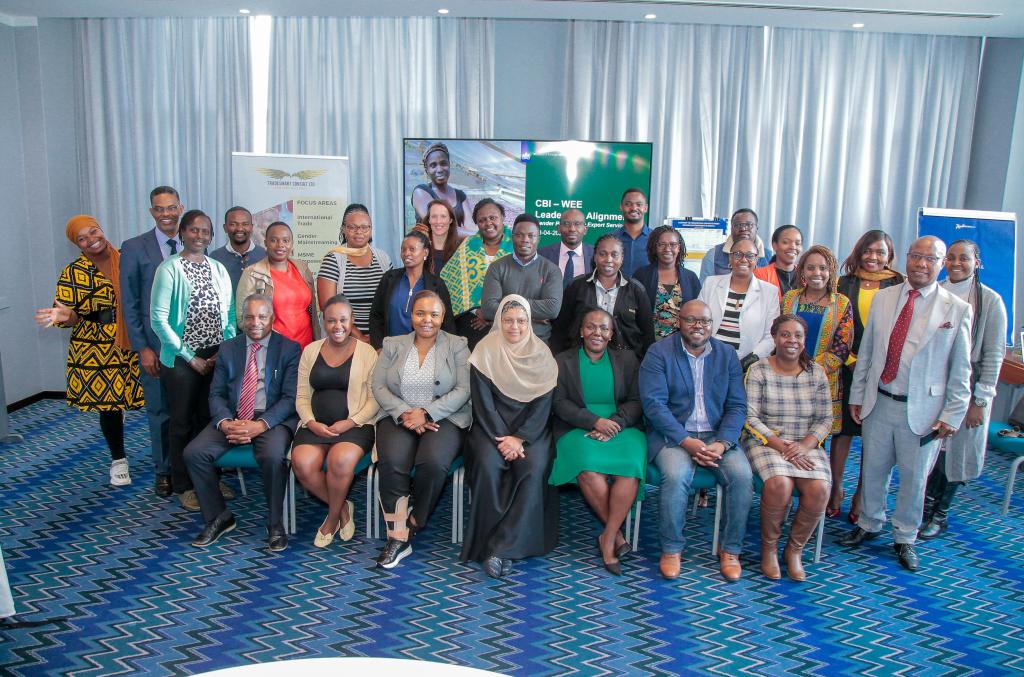Women's Economic Empowerment Kenya
The Women’s Economic Empowerment aimed at strengthening the supportive environment for women entrepreneurs in Kenya.
The overall long-term vision of this new project is that women entrepreneurs in Kenya have the power to act, through self-confidence, decision-making and capabilities. Women entrepreneurs in Kenya will be empowered by the project, through the coordinated availability of gender-responsive business development services, leading to business growth, better access to markets and increased export (to the European Union (EU).
The project is divided into 4 key pillars:
Pillar 1: Access to markets
A significant gap among women entrepreneurs in Kenya is the lack of access to information and knowledge on how to access export markets. This pillar aims to improve access to export services for women-owned businesses in Kenya. Building the capacity of trade support institutions (TSIs) enables them to offer gender-responsive business development services (BDS) for women entrepreneurs. This, in turn, increases women entrepreneurs' participation in international trade.
Pillar 2: Access to finance
Research shows that Kenyan women entrepreneurs have bank accounts. But they also have limited access to formal finance due to a of lack of information, perceptions that they do not meet the requirements or a lack of collateral. The project aims to improve the enabling environment for women entrepreneurs in export by working with financing providers and coaching women exporters:
- Improve the interaction between financing providers and women exporters through boot camps;
- Provide sustained financial management, loan application and compliance coaching;
- Mediate with financing providers to improve the gender responsiveness of products/services and loan application success rates.
Pillar 3: Inclusion of women entrepreneurs at the base level
Women entrepreneurs at the base level often face challenges in improving business processes. These include limited skills in accessing information, a lack of self-confidence, and entrepreneurial skills. This project aims to empower women macadamia nut farmers in Kenya by supporting them with training programmes on:
- Macadamia farming;
- Entrepreneurship; and
- Self-confidence.
On the other hand, the project supports macadamia processing companies that invest in the macadamia value chain to improve their competitive position in the market.
Pillar 4 Collaborative partnerships among associations (One Voice)
This project pillar aims to establish a collaborative platform for associations representing women in trade in Kenya, creating a platform that strengthens advocacy, builds capacity, shares resources, and improves overall coordination. The platform improves the engagement of policymakers and private sector entities, leading to more gender-responsive trade policies and more inclusive trading practices.
The One Voice Women’s Trade network is launched in 2025. Please check out the website for more information: One Voice Women Trade Network
Partners
| Partner | Website | Service/Product |
|---|---|---|
Kenya Plant Health Inspectorate Service (KEPHIS) | https://kephis.go.ke/ | Assure the quality of agricultural inputs and produce |
Horticultural Crops Directorate (HCD) | https://www.afa.go.ke/home-horticultural-crops-directorate/ | Regulating the production, processing, and marketing of horticultural crops |
Organization of Women in Trade Kenya (OWIT) | https://owitnairobi.org/ | Empower women to transform communities through global trade. |
Women’s Indian Chamber of Commerce and Industry (WICCI) | https://wiccikenya.com/ | Empower all women through the main pillars of Economic, Social, and Leadership Empowerment. |
Fresh Produce Consortium of Kenya (FPCK) | https://fpckenya.co.ke/ | Influence and advocate for a conducive national and international business environment, policies and trade agreements horticulture industry in Kenya. |
Kenya Export Promotion Brand Agency (KEPROBA) | https://makeitkenya.go.ke/ | Implement export promotion and nation branding initiatives and policies to promote Kenya’s export of goods and services. |
| SBM Bank | https://www.sbmbank.co.ke/ | Financial Institution |
| Family Bank | https://familybank.co.ke/ | Financial Institution |
Private Equity Support | https://www.privateequity-support.com/ | Advisory Consulting Firm |
| Truvalu | https://truvalu-group.com/ | Financial Support and Advisory Firm |
| The Village Nut Company | Macadamia Agro-processor | |
| Onja Uone Limited | Macadamia Agro-processor | |
| Privamnuts EPZ Kenya Ltd | Macadamia Agro-processor | |
| Tropical Mac Epz Ltd | Macadamia Agro-processor | |
| Batian Nuts | Macadamia Agro-processor | |
| County Government of Embu -Department of Agriculture | Agricultural Extension Service | |
| County Government of Meru -Department of Agriculture | https://meru.go.ke/94/welcome/ | Agricultural Extension Service |
| County Government of Tharaka-Nithi-Department of Agriculture | Agricultural Extension Service | |
| County Government of Nyeri -Department of Agriculture | Agricultural Extension Service | |
| County Government of Trans-Nzoia -Department of Agriculture | Agricultural Extension Service | |
| Kenya Association of Women Business Owners | www.kawbo.org | Women Business Owners Association |
| The Retail Trade Association of Kenya | www.retrak.co.ke | Retail Trade Association |
| PassionProfit | www.passionprofit.co | Leadership & Enterprise Development |
| OWIT Kenya | www.owitnairobi.org | International Trade & Business Association |
| Elevate SMEs | www.elevatesmes.co.ke | Enterprise Development |
| Busia Women Cross Border Traders Association | - | Cross Border Traders Association |

Ask a question
Are you a European importer?
Are you looking for good, reliable suppliers in developing countries? Collaborate with us in one of our export coaching projects.
Get involved in this project